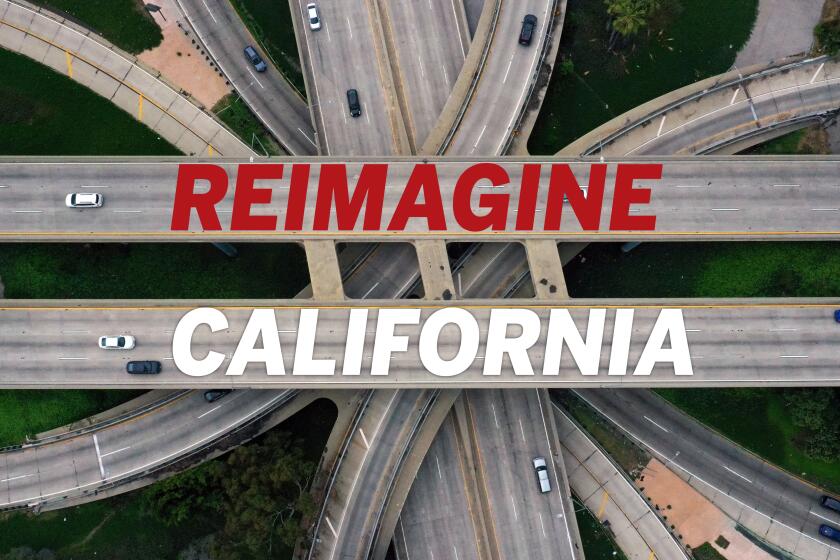Column: We’ve seen a lot of toxic white privilege lately, but Amy Cooper’s tops it all
- Share via
By now, you have heard about or watched the video of Amy Cooper, a white investment executive, who called the police on Christian Cooper, a black science editor who asked her to leash her dog in Central Park early on Memorial Day morning.
Christian Cooper was birding in the Ramble, a wooded area of the park loved by bird watchers and off limits to unleashed dogs. In a post on Facebook, he explained that after Amy Cooper refused to leash her dog, he pulled out some dog treats he carries “just for such intransigence.”
That’s actually a genius move. Dog owners don’t want their dogs eating treats from strangers. How to prevent that? Leash the dog.
“That’s when I started video recording with my iPhone, and when her inner Karen fully emerged and took a dark turn,” he wrote.
As the video begins, she is holding her cocker spaniel Henry by the collar and alarmed that she is being recorded. She asks him to stop and approaches him with her arm up as if to block his camera.
“Please don’t come close to me,” he asks twice.
She threatens to call the police: “I’m going to tell them there’s an African American man threatening my life,” she says.
“Please tell them whatever you like,” he calmly replies, encouraging her to call police.
Then, she makes the call. “There is an African American man, he is recording me and threatening myself and my dog.”
As her voices rises, she lifts her dog off the ground by his collar — because he’s still not leashed — and the dog yelps and thrashes. She begs for help in a faux hysterical tone, and it’s hard not to wonder what she’s thinking. Race has nothing to do with their run-in. Can she really be ignorant of the dangers of making a false accusation against a black man? She finally leashes Henry. Christian Cooper thanks her for doing so, and the video ends.
Later, in an interview with WNBC-TV in New York, Christian Cooper said, “We live in an age of Ahmaud Arbery, where black men are gunned down because of assumptions people make about black men, black people, and I’m just not going to participate in that.”
“It reminds me of the Emmett Till case,” said USC law professor Jody David Armour, who studies race and criminal justice. “A white woman who alleged that a 14-year-old black male had insulted her, had treated her in a way that somehow challenged the racial caste system, the racial hierarchy, and that seems like what could be going on here.”
In 1955, Till was lynched by a white mob in Mississippi. Six decades later, the woman he allegedly insulted recanted her tale.
::
We have become accustomed to videos of white people behaving badly in the age of coronavirus. The ones who refuse to wear masks, who parade around with guns as they assert their right to ignore social distancing rules, who cough in the face of restaurant managers who ask them to move tables.
But this video is of another magnitude entirely. It’s no wonder it moved through the digital world with lightning speed.
It is white privilege personified as malicious, deliberate cruelty.
This is not some clueless woman moving through the world unaware of the privileged bubble that cushions her. This is a display of racism in its most pernicious form; Amy Cooper posing as a white maiden in distress because a black man called her out for her anti-social behavior. She wasn’t just ignoring the long, sordid history of black men being falsely accused of transgressions by white women, she was exploiting it, and reflexively at that.
If we need any reminders about what can happen when black men are confronted by police, another horrific story was in the news Tuesday morning: In Minneapolis, a white police officer responding to a “forgery in progress” call, used his knee to pin George Floyd’s head to the ground. Bystanders recorded the incident, and begged the officer to take his knee off the distressed man’s neck.
“I cannot breathe! I cannot breathe!” Floyd yelled. “Don’t kill me!”
Hours later, he was pronounced dead at a local hospital. The FBI is investigating his death.
::
Help the Los Angeles Times reimagine what California should look like after the COVID-19 pandemic ends.
For Amy Cooper, the repercussions were swift.
Hours after Christian Cooper posted his video on Facebook, and his sister Melody Cooper amplified it by posting it on Twitter, #AmyCooper was the No. 1 trending topic on Twitter.
By Tuesday morning, the hashtag was still going strong.
The animal rescue organization that had placed the cocker spaniel with her announced that she had “voluntarily surrendered” Henry, while it investigated the dog’s apparent mistreatment.
Cooper’s employer, the global investment firm Franklin Templeton, announced on Twitter that it had put her on administrative leave pending an investigation, and by Tuesday afternoon she had been fired.
Cooper, for her part, was contrite: “I sincerely and humbly apologize to everyone, especially to that man, his family,” she told WNBC on Monday evening. “When I think about the police, I’m such a blessed person. I’ve come to realize especially today that I think of [the police] as a protection agency, and unfortunately, this has caused me to realize that there are so many people in this country that don’t have that luxury.”
What kind of people, Amy? And why do you think this is so?
“I’m not a racist,” she told CNN. “I did not mean to harm that man in any way.”
“Hardly anyone will admit they are racist,” said Armour. “It’s hard to find a KKK member who will say they are racist. But what makes you racist in a situation like this is she manifested no fear that we could discern. She seemed to be simply weaponizing her whiteness. She seemed to be using her status superiority as a cudgel to bludgeon this black man in the kind of dispute that arises a lot of times in public places. Imagine if this guy was white.”
I strongly doubt there would have been any faux hysteria, no 911 call. What Amy Cooper did was the very definition of racism: She did mean to harm Christian Cooper. And it was because of his race.
Tragically, no amount of denial in the world will change that.
The “Karen” meme has taken on new meaning during the coronavirus crisis as a label for someone who feels entitled to prioritize her own desires over public safety
More to Read
A cure for the common opinion
Get thought-provoking perspectives with our weekly newsletter.
You may occasionally receive promotional content from the Los Angeles Times.












